- Home
- Taylor Caldwell
Captains and the Kings Page 3
Captains and the Kings Read online
Page 3
Chapter 2
Joseph, now sitting on the edge of the bunk where his little brother slept with tears on his wan cheeks, remembered all the dolorous suffering of Ireland and his father who waited for his family. He remembered, also, that the English Queen had contemptuously offered multitudes of the Irish free passage to America to escape starvation and oppression; it was evident that she considered America still a penal colony as her grandfather had so considered it, and still a British possession though a worthless one. The multitudes who had no alternative but death and brutality and starvation had fled their stricken land, with weeping. But Daniel's brother had sent passage money for the steerage. Daniel, hopeful always, had hesitated. Sure and matters were not so evil now in Ireland. Some farms were producing again. It was "best to wait." The Sassenagh was tiring of his vindictiveness. Then the little family was evicted for taxes and a cousin of Moira's in Carney took them into his crowded small cottage. For once Daniel was more discreet. He did not squander the passage money. He shared a portion of it with Moira's cousin for necessary bread and a handful of vegetables -half-rotten-once a week, and a slab of bacon. When that was gone, and the passage money in danger, Joseph had confronted his father. Moira had not told her husband that only yesterday an English soldier had accosted her in the main street of Carney, that little village, and that when he had dragged insistently on her shawl she had struck him in the face with her last strength. He had punched her, then, in the breast until she screamed in agony, and then had kicked her to the stones, and had left her, shouting with mirth and execrations and foul epithets. Moira's cousin's wife had seen this, and had assisted the weeping crouched woman home, and Moira had begged her not to tell Daniel, and Joseph had heard. The shawl was moved aside, and the buttons of the ragged bodice opened, and Joseph saw the black and purple bruises on his mother's young white flesh, so shrunken with starvation now, and he had clenched his fists and he had known his first lust to kill. So Daniel, packing his few clothes in a black cardboard portmanteau, had left his country with tears in his eyes, and had glanced for the last time at his son, Joseph, who seemed to him to be an old and unrelenting man and not a child, and the innocent reproach in Daniel's eyes had not touched Joseph at all. For fear that his father might turn back at the very last Joseph had accompanied Daniel to the pub in the stark cold wet dawn, and there had waited with him for the coach to Queenstown, and the ship. The rain struck their faces and Daniel had tried to whistle, but it was a sad sound. When the coach rumbled up, and Daniel had thrown his luggage on the roof, the father had turned to his son and said, "Ye will be the father to your mother and Scan, Joey, and bring them to me in America." "Yes, Dad," said the boy. He looked at the four great horses, steaming and stamping in the half-light, their hides agleam with water and sweat, and at the white faces staring through the running windows at the new passenger. The coachman cracked his whip and it was a cutting sound in the village silence, and Daniel had hesitated for a final word, and then had smiled his radiant smile, climbed into the coach, and was gone. It was as if, to Joseph, a charming but incompetent older brother had departed, and he shook his rain-wet head and smiled a little in love and reluctant indulgence. He knew that the charming and the lovable had their place in life, but it was a trivial place and the first to be shattered when disaster struck. It was a village of gingerbread, where they lived and had their uncertain being, and the roofs were only sugar-icing. They were like flowers, the adornment of gardens, and so were not to be despised, except when life demanded that food be planted in their place for sustenance. If they were then uprooted, it was sorrowful but inevitable. Joseph did not fault them. They had been born so. Now, as he sat with his little brother, Scan, who was fitfully sleeping, he feared that Scan was too like the father and he vowed in his desolate and emptied heart that he would teach Scan to face truth without fear, and despair with resolution, and to despise false words of hope. The world was an evil place, and did not he, Joseph, know it surely? It was a dangerous place. Only courage and will could conquer it or at least cow it so that it withdrew from a man's throat with a snarl and crawled away for a time on its belly. But it always waited and lurked for a moment of weakness on the part of its victims, a moment of expansive optimism and buoyancy and belief in a rainbowed future. Then it struck the fools to the death. Joseph had read his father's books, not with Daniel's interpretation that man became better and nations more civilized as time passed, but with cynical understanding. Tyranny was man's natural mode of government and his secret desire, and liberty was always threatened by men, themselves, through their governments and through their easy acquiescence and lack of fortitude. On realizing this, Joseph became a man and was no longer a child or even a youth.
Joseph sat in the deepening cold of the men's portion of the deck, and thought. The sick moaned in their pain-racked sleep. The men no longer sang, but sat mutely side by side on the lower bunks, their heads and hands hanging, or they, too, slept. The ship groaned and creaked. The cattle below lowed uneasily. Joseph sat near his sleeping little brother, his eyes fixed, almost without blinking, on the gritty deck beneath his feet. Where would they go, now? Where would they be permitted to land, if ever? Joseph knew of the many little ships that had put out from Ireland during the Famine, only to be broken on reefs or to founder in the ocean, or to bring a dying cargo back to the stricken shore. He knew that a half or more of those who had sailed for America on great ships had died before their arrival of disease and Famine Fever and slow starvation, and had been buried at sea. (Many of those on this ship had suffered that and had been lowered quickly into the water at night, accompanied only by the prayers of the old priest and the Sisters.) The survivors, he had learned, had been forced to take shelter in cold sheds on the wharf, there to suffer or die without food or water or warm clothing, until "authorities" could determine whether or not they were a danger to the cities with their cholera and "consumption" and fever. The healthy, and the lucky, then had been permitted to join relatives and friends who waited for them and who could take them to warmth and fires and food. The dead were shoveled into mass graves, anonymous and forgotten. Many of the ships, too, had been turned back at various ports in America. They were not wanted. They were the destitute and the starveling, and they were "Romans" and Irish and trouble-makers and strange. The Religious were especially despised and secretly feared.
Was Daniel Armagh still waiting for his family on the wharf in New York? Did he know they had been rejected, and could not land? It was winter: Was he standing at the door of one of the sheds and staring hopelessly at the big anchored ship with its slack sails and its wet fortress-like hull? Was he doing, thought Joseph with an acrid taste of bitterness in his mouth, anything at all for his imprisoned family except praying? Did he know that hrs young wife was dead? Dead. Joseph squeezed his dry eyes shut and his chest became tight and smothering with his huge hatred and sorrow. Oh, Mum, he said in himself. They could not consign her to the ocean in the harbor. They would wait until they were at sea, again. They would bind her in a ragged blanket and fasten her body to a thin frame of wood, and she would go into the cold and blackness of the water just as her soul was in the cold blackness of nothingness now. But he dared not think of this yet. There was the immediate calamity to be faced. Would they be returned to Ireland, and would they then all perish inevitably on the way back, or on landing? Joseph did not ask himself: "Is there no pity and mercy among men, no help for the helpless, no justice for the innocent?" That question was for men like his father and those who had unrealistic hope, and the weak and sentimental and stupid. The real question confronted him: How was he to assure the survival of his brother and his infant sister, and himself? If he were alone or had only Scan to consider he might contrive, in the morning just before dawn, to steal from the ship when it moved to the wharfs to unload the cattle and the passengers who comfortably traveled on the upper decks, from which steerage passengers were excluded. Authorities were not too difficult to circumvent, if one assumed a
confident and assured appearance and was clean and quiet. However, there was the baby, and even the dullest of authorities would be curious about a youth with an infant in his arms, and accompanied by a young child also, with no apparent guardians. Though he, Joseph, could doubtless manage to provide some food and shelter for two boys, the little girl needed womanly comfort and care, and where were these to be found for the derelict? A sick man nearby began to cough violently, and at once the suffering and restless sleepers about him stirred and began to cough also, in tearing and rasping and spitting chorus. One by one the convulsion of misery spread through the men's quarters, then was taken up by the women and children beyond the jute curtain, until the dolorous echoes went back and forth incessantly. Only one lantern had been left lighted in the men's quarters and it enhanced the cold and shifting dimness rather than relieved it. Joseph remained unaware, except that he tucked the blanket closer about his sleeping brother. He, himself, had not put on his thin coat; he sat in his shirt and traced, over and over, a stain on the knee of his pantaloons with his index finger. His mind was one intensity and focus on his predicament. Weeks ago, at the beginning of the journey, he had felt compassion for his fellow travelers, especially the children, and fear that his family might acquire one of their diseases. But now his compassion was ruthlessly quelled in his own struggle to survive. He had no time even for grief or despair. The four portholes began to emerge grayly from the gloom as dawn approached. The stench from unwashed and dying bodies and from the latrines filled the cold dank air. The wooden ceiling dripped. The sawdust on the floor was smeared ominously with the blood from diseased lungs. Joseph traced the stain on his knee with rising quickness. His strong and russet hair hung in ragged points over his forehead and ears and neck. He felt a touch on his shoulder and looked up with blank and sunken eyes. Old Father O'Leary was standing before him, in his long nightshirt. "You haven't been to bed," said the priest. "Sure, and you will be sick, too, if ye do'not rest, Joey." "How will we let my father know we cannot leave the ship?" asked Joseph. "In the morning, I will go ashore-it is permitted for me for an hour- and I will find Danny and tell him, and we should know, then, where we are going. It is to Philadelphia, I think, and let us pray that they will permit us to land. Joey, you must rest for a bit." "Philadelphia?" said Joseph. "Is it far from New York? It has a pretty sound." The old priest smiled painfully, his ancient and haggard face falling into deep gray lines. His shock of white hair was disheveled and as ragged as Joseph's, and his nightshirt dragged on his skeleton body. "Philadelphia," he said. "It means the City of Brotherly Love. Pray they will have some 'love' for us, Joey. We must trust in God-" A flick of wild impatience touched Joseph's eyes. "If it is far, hovj; then will my father reach us and take us home to New York?"
"Trust in God," said the priest. "Nothing is impossible with Him. Joey, there is some hot tea the women are brewing, and I will bring you a cup, and then you must rest awhile." "We will travel to New York," said Joseph. "I have fifteen dollars, which my mother gave to me for keeping." It was as if he were speaking aloud to himself, and the priest's face trembled with sorrow and pity. "It is a lot of money, Joey," he said. "Be comforted. I have spoken to a seaman and he will bring some milk for the baby before the cattle are taken ashore, if he can manage to steal below. I gave him four shillings." "I will repay you, Father," said the boy. He looked down at his sleeping brother. Was the child's face flushed with fever? Joseph touched his cheek. "When will they throw my mother into the sea?" asked the boy, raising his head and staring at the priest. "Joey," said Father O'Leary, and he felt a pang of fear for the boy, for this dead composure was unnatural. He had not shown a tear or displayed any anguish. "It is only your mother's body, but her soul is with God and His Blessed Mother. Let that comfort you, that her earthly pain and striving are over, and she is at peace. I have known her since she was a babe, and I baptised her, and never was a sweeter colleen and a woman. Her memory will bless you, and from the radiance of heaven she sends her love to you." "It will be when we sail, will it not?" said Joseph. "You must let me know." Nothing stirred on his face nor in his dark blue eyes, so gritty now with black fatigue. "I will, that, Joey," said the priest, and again he touched Joseph's shoulder timidly. But it was like touching rigid stone. "Will ye join me in prayer for your mother?" "No," said Joseph. His young voice was the voice of a man, and indifferent. "It is that you believe she has no need of prayer, my child?" "There are sreamcars from Philadelphia to New York, are there not?" said Joseph.
"To be sure, Joey. All will be well, if we trust in Our Lord. Joey, it is cold. Put on your coat. And the seamen will be bringing our breakfast before we sail."
He helplessly patted the boy's shoulder, then sighing he turned away, for a sick man had weakly called him in his extremity. He wore old carpet slippers and he shuffled on the sooty floor. Out of exhaustion, the coughers were now quiet and some were lifting themselves on their elbows, or rising and shambling to the latrines. Joseph felt for the packet which hung on a string around his neck, and against his chest. The gold certificates were safe. Fifteen dollars. Three pounds. It was a lot of money which his father had sent to the family before they had left Ireland. And his wages were but two pounds a week. It had taken Daniel Armagh several months to accumulate such a sum.
One porthole was suddenly rosy with dawn, and Joseph stood up on his tiptoes and looked outside. Almost imperceptibly the ship was moving to a pier among a forest of bare masts and crowded hulls. Sailors were already working on the anchored ships, and their rude hoarse voices came faintly to Joseph whose face was pressed against the salt-crusted thick glass of the porthole. The slow oily water of the harbor was black and sluggish, but its small crests were lighted with cold pink. Now Joseph saw the long piers and wharfs and warehouses in the growing light, and beyond them crowded brick houses and other low buildings. Their roofs were wet with moisture and here and there a street could be seen from the ship, narrow and cobbled and winding, with patches of gray leprous snow piled along the curbs. Drays and wagons were beginning to move along those streets, horses straining. A nearby packet, soaked sails billowing, bowed and withdrew from a pier and Joseph could hear the shrill hiss of its passing, so near did it venture. Curious seamen's faces peered at the desolate Irish ship which was to take its place at the pier. Some of the vessels were of the new steam variety and they suddenly poured black smoke and soot into the silent morning air, and their horns bellowed for no reason at all. Foot by foot the Irish Queen moved to the docks and the long sheds upon them, and Joseph strained fiercely to see the faces of the lonely crowds gathered on the wooden wharf. Was his father among them? There were many there, including some women, and they were weeping, for they already knew that the steerage passengers would not be permitted to land. Some forlorn hands waved in greeting. A man was raising a flag on a staff nearby and for the first time in his life Joseph saw the stars and stripes whipping wetly in the cold wind of winter and unfurling heavily to the new and hopeless day. "So, and that is the brave flag," said a man at another porthole, and other men joined him to gaze at the forbidden land. One laughed derisively, then burst into a fit of coughing. Others joined him, as if a signal had been given. "They don't want the likes of us," said another voice. "Sure, and they do, and we go to Philadelphia," said still another. "I have heard it, meself, with these ears, from Father."
The door at the end of the deck opened and three seamen appeared with a cart on which steamed bowls of oatmeal and fresh tea, and there were tin plates of hard biscuits and bread. The men and boys rushed eagerly to seize the food but Joseph did not move. Was that his father there, that tall man whose fair hair showed under his workman's cap? Joseph struggled for a moment with the fastening of the porthole, but the iron had corroded and it could not be moved. Ah, yes, it was surely Daniel Armagh there waiting, for the quickening light showed his fine features and Joseph's eyes were keen. Joseph's thin fist beat impotently on the porthole, and he shouted. His cries awakened Scan, who began to whimper, a
nd Joseph pulled him upright in the bunk and forced his face against the porthole. "There!" he cried. "There is Dada, Scan, waiting for us!" Scan wailed. "It's not Dada," he protested. "I want my brekky." Joseph had forgotten. He looked about him anxiously. The cart with its steaming but depleted load was about to pass behind the curtain to the women. Joseph raced after it. "My little brother," he said. "He has not eaten." The seamen, in their dirty and crumpled uniforms, glared at him suspiciously. "You'll not be wanting extra for yourself, then?" one demanded. "There's not enough." "I don't want it for myself," said Joseph. He pointed at Scan who was sitting and crying on the edge of the bunk in his drawers. "My brother. Give him mine, too." A hot bowl was thrust into his hands and a hunk of moldy bread, and he was pushed away. He carried the breakfast to Scan who looked at it and whimpered again. "I don't want it," he wailed, and retched. Joseph's heart clenched in fresh dread. "Scan!" he exclaimed. "You must eat your breakfast or you will be ill, and there is no time." "I want Mum," said Scan and turned away his pretty face. "But first, you must eat," said Joseph with sternness. Was that indeed fever on Scan's thin cheeks? Oh, God, Joseph muttered with hatred between his clenched teeth. He felt Scan's brow. It was cool but sweaty. "Eat," Joseph commanded, and the new note in his voice affrighted his little brother who began to cry again and sniffle. But he accepted the tin bowl and the big spoon and, sobbing, forced the porridge into his mouth. "Good boyeen," said Joseph. He looked at the bread in his hand and hesitated. There was a gaunt hollow in him. But if he sickened, himself, then there would be no help for the other children. He began to chew on the hard bread, and now and then he rose on tiptoe to watch the slow moving of the ship to the wharfs. The man with the fair hair had disappeared. Then there was the rattling of chains, a loud thump, and the broad wooden gangplank was lowered to the wharf. A chorus of voices rose, and disturbed gulls began to wheel in clouds above the ship and against a sky from which the red light had faded and had now become dun and threatening. Joseph could hear the cheeping of the gulls, and from below the movement of cattle. A wet sail fell to the deck. Water muttered and hissed about the hull. The harbor waters were filled with refuse and floating wooden beams, and now the ocean was the color of pewter. In a moment it was pitted by a harsh and driving rain mingled with snow. Joseph shivered, and chewed somberly. This was not the golden land of which his father had written. The streets looked alien and sullen and deserted for all the wagons and the carts and the occasional gleaming umbrella that scuttled along the cobblestones or on the bricked walks. The land was little and low and the skies were immense, and there was only desolation and icy chill and loneliness and abandonment. This was no green Ireland with enormous skyscapes of fairyland and the fresh fragrance of grass and trees and the still metallic glitter of blue lakes and snug thatched roofs and gardens knee-deep in bright bloom and racing streams filled with fish and herons, and songs of larks and hedgerows shining with buttercups and the pungent smell of burning peat and warm little fires and laughter in the pubs and the gay lilt of fiddlers. Here were no mysterious lanes overhung with oaks and hollyhocks, no welcome cries, no songs, no smiling lips. Joseph, still peering out at New York, saw the coming to life of factories and their heavy black tides of smoke darkening a sky already torn with storm. A mist was beginning to rise from the water and soon there would be fog as well as rain and snow. Joseph could hear the winter wind, and the ship rocked against the wharf. The boy's mouth opened in soundless pain and misery, but he immediately quelled the shameful emotion. He had terrible news for his father, and now he thought of Daniel as a child who must be protected. There were hurrying loud footsteps on the decks above, and calls, and Joseph knew that the fortunate passengers were disembarking and their trunks and boxes with them. By straining he could see the first passengers leaving, the women in furs, the men in thick greatcoats and tall beaver hats. Carriages were appearing on the wharfs, with coachmen. The wind whipped coats and the men, laughing, held their hats to their heads and helped their ladies against the blast and to the carriages. The horses' sleek bodies smoked. The water smoked. The sky appeared to smoke. And the morning steadily darkened. Luggage was taken ashore, and waiting crowds embraced the passengers, and even from the closed steerage Joseph could hear laughter and excited twitterings, and could see the happy movements of snugly clad bodies. The crowd waiting for steerage passengers had retreated like a frightened band of cattle, and huddled together to let the fortunate pass to their carriages, followed by carts of leather luggage and trunks banded in iron and brass. These were not those whom the Queen called "the Irish peasantry," but were landed gentry or Americans returning from sojourns abroad. Joseph watched them enter their closed carriages, laughing at the wind, the ladies' bonnets whirling with ribbons, their skirts ballooning. The carriages rumbled away at last, and now there was only the wretched crowd who would not be permitted to enter the ship nor even to see their relatives in the steerage, for fear of contagion. Nor were steerage passengers, not even during the long voyage, ever permitted to climb to the upper decks for air and sunshine. For the first time in his life Joseph felt the awful sickness of humiliation. True, in Ireland, the Irish were despised and reviled and persecuted by the Sassenagh, but then one in turn stoutly despised and reviled the Sassenagh, himself. No Irishman ever felt inferior even to his "betters," or to the English. He walked and lived proudly, even when starving. He never raised a piteous cry for succor and sympathy. He was a man. But Joseph now guessed that in America the Irishman was not a man. Here he would be permitted no pride in his race and in his Faith. He would meet only with indifference or contempt or rejection, less than the cattle which were now clambering down the oily wet gangplank, accompanied by amorphous figures huddled against cold and storm. How Joseph guessed the truth he never fully understood, except that he suddenly remembered that though his father had written joyously of warmth and "good wages" he had not written of the people among whom he had found himself but only of brother Irishmen who had fled the Famine. There had never been any mention of Americans nor gossip of neighbors nor bits of news concerning fellow workers. There had been one remark about the "little church" near the rooming house where Daniel worked as a janitor, and where he attended Mass. "But it is closed in the day, and there are no visits to the Blessed Sacrament but on holy days," Daniel had written, "and there is but one Mass on Sunday." Daniel had spoken often of the freedom in America before he had left Ireland. He had not written of it but once during these last months. Joseph looked at the flag twirling and tugging in the wind on the wharf. Now nothing was on the wharf but piles of freight and seamen pushing barrows and carts, and the silent and rain-soaked crowd of wretched folk still hoping and praying numbly for the sight of a beloved lost face on the ship. The heavy dimness of the stormy morning was too deep now for the identification of any features. The watchers seemed but of one body and one mass, hopeless and unmoving. Fog mingled with smoke. The water quickened and began to boom restlessly. "There is naught here for us, I am thinking," said a man near Joseph, and his voice was sick with despair. But Joseph's young face grew smaller and tighter with resolution, and his exhausted eyes were charged with angry bitterness. Scan moved against him, whimpering insistently. "I want my Mum," said the child. "Where is Mum?" I do not know, thought Joseph. Sure, and it must be nowhere. He said to Scan, "Soon. She is sleeping." The child had left a spoonful or two of cold porridge in the bowl and Joseph ate it. Scan watched him, then he began to cry. "Mum," he sobbed. "Mum?" "Soon," said Joseph again. He thought of his infant sister. He hesitated.

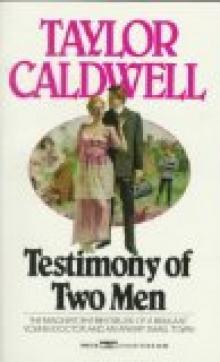 Testimony of Two Men
Testimony of Two Men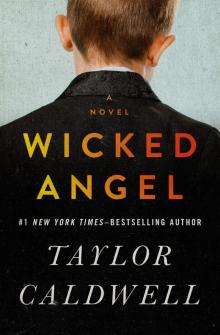 Wicked Angel
Wicked Angel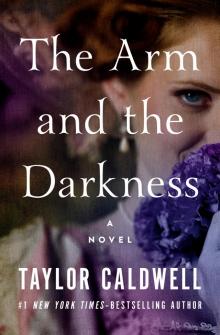 The Arm and the Darkness
The Arm and the Darkness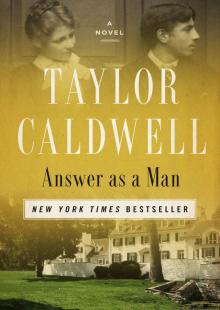 Answer as a Man
Answer as a Man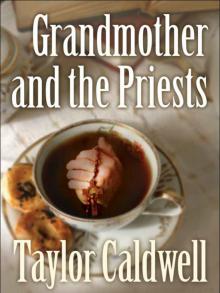 Grandmother and the Priests
Grandmother and the Priests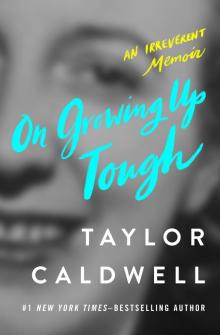 On Growing Up Tough: An Irreverent Memoir
On Growing Up Tough: An Irreverent Memoir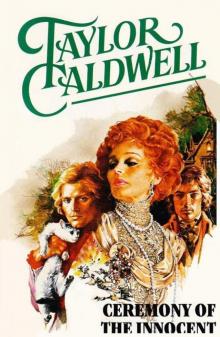 Ceremony of the Innocent
Ceremony of the Innocent The Listener
The Listener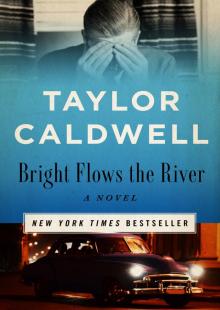 Bright Flows the River
Bright Flows the River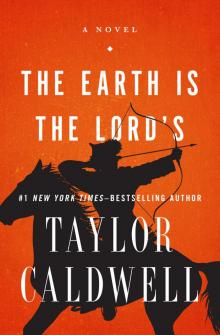 The Earth Is the Lord's
The Earth Is the Lord's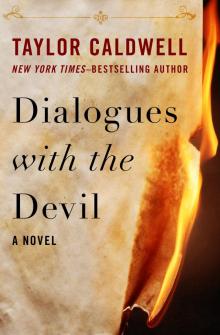 Dialogues With the Devil
Dialogues With the Devil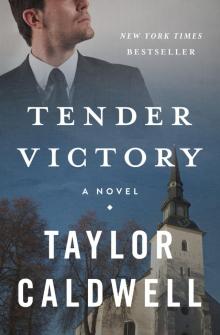 A Tender Victory
A Tender Victory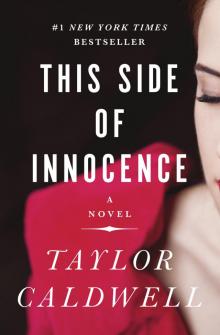 This Side of Innocence
This Side of Innocence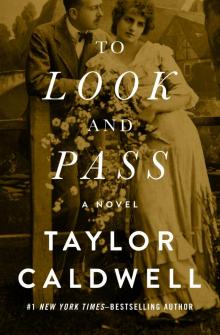 To Look and Pass
To Look and Pass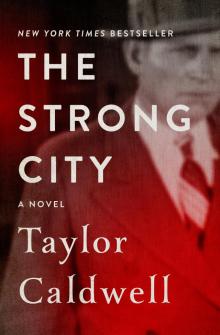 The Strong City
The Strong City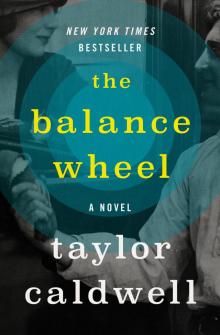 Balance Wheel
Balance Wheel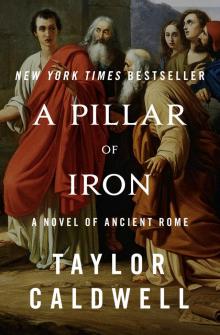 A Pillar of Iron: A Novel of Ancient Rome
A Pillar of Iron: A Novel of Ancient Rome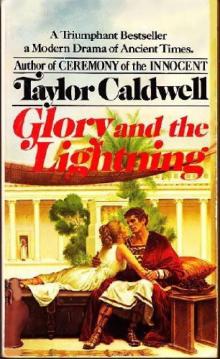 Glory and the Lightning
Glory and the Lightning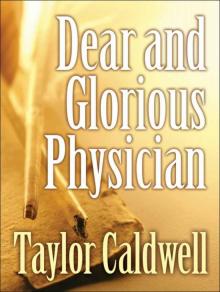 Dear and Glorious Physician
Dear and Glorious Physician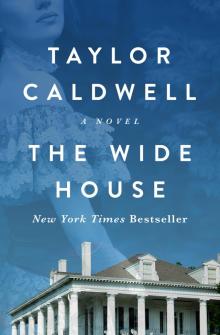 The Wide House
The Wide House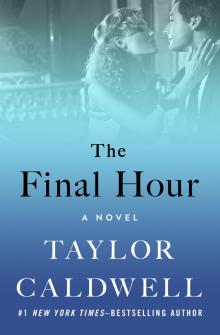 The Final Hour
The Final Hour Never Victorious, Never Defeated
Never Victorious, Never Defeated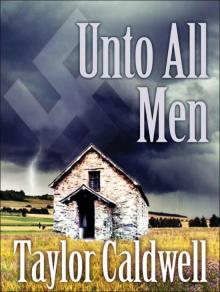 Unto All Men
Unto All Men The Turnbulls
The Turnbulls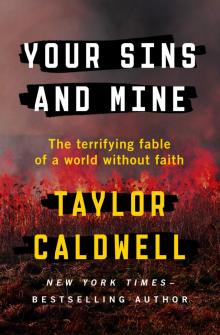 Your Sins and Mine: The Terrifying Fable of a World Without Faith
Your Sins and Mine: The Terrifying Fable of a World Without Faith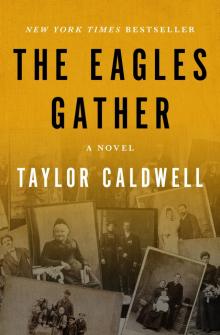 The Eagles Gather
The Eagles Gather Let Love Come Last
Let Love Come Last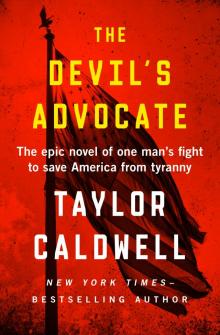 The Devil's Advocate: The Epic Novel of One Man's Fight to Save America From Tyranny
The Devil's Advocate: The Epic Novel of One Man's Fight to Save America From Tyranny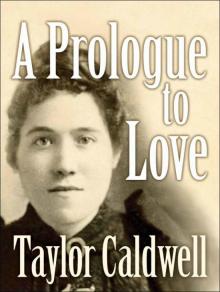 A Prologue to Love
A Prologue to Love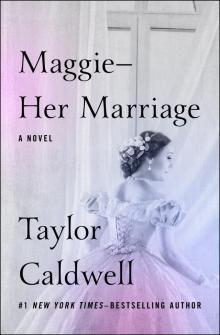 Maggie: Her Marriage
Maggie: Her Marriage The Late Clara Beame
The Late Clara Beame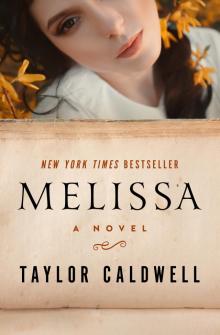 Melissa
Melissa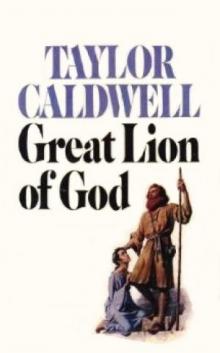 Great Lion of God
Great Lion of God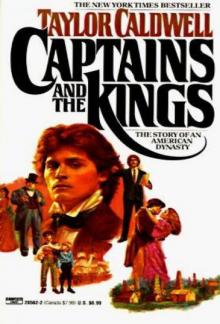 Captains and the Kings
Captains and the Kings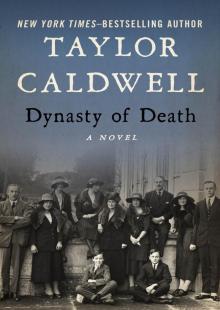 Dynasty of Death
Dynasty of Death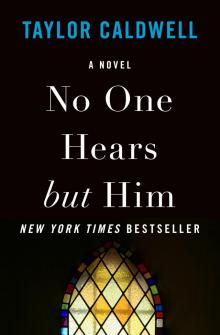 No One Hears but Him
No One Hears but Him The Sound of Thunder
The Sound of Thunder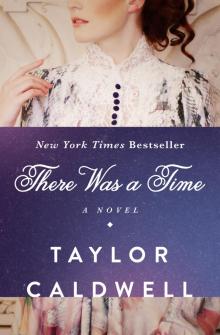 There Was a Time
There Was a Time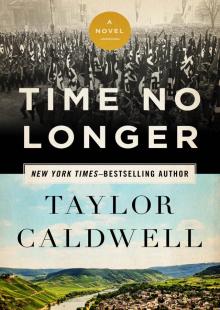 Time No Longer
Time No Longer I, Judas
I, Judas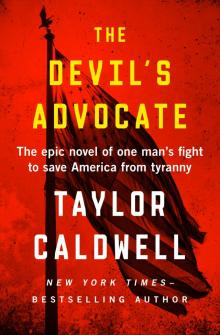 The Devil's Advocate
The Devil's Advocate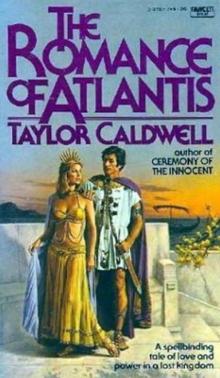 The Romance of Atlantis
The Romance of Atlantis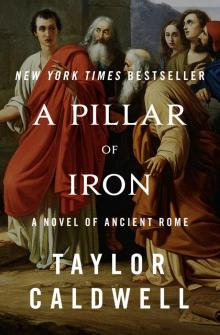 A Pillar of Iron
A Pillar of Iron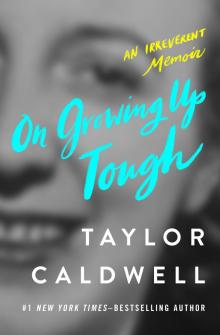 On Growing Up Tough
On Growing Up Tough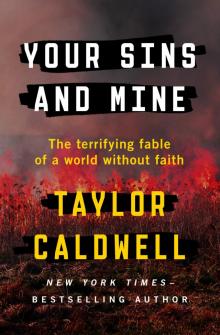 Your Sins and Mine
Your Sins and Mine